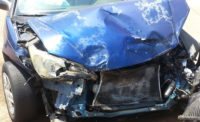Posted with permission from Fairwarning.org:
Can a used car be marketed as “safe” or “certified” even if it has defective air bags, a faulty ignition switch or other potentially lethal problems?
Yes, so long as the used car dealer discloses that the vehicle may be subject to a pending safety recall.
That stance, taken by the Federal Trade Commission, is at the heart of a recent legal settlement with General Motors and two used car dealers over deceptive advertising practices. But it is now being put to the test in a federal court in Washington, D.C., by auto safety activists.
The safety groups contended in legal papers filed Friday that the settlement places unaware car buyers, their passengers and others at “the risk of injury or death caused by the defective vehicles.” In essence, the concern is that buyers will have a false sense of security if a car is described as safe and won’t take care of the defect that prompted the recall.
“Extremely detrimental”
“The sale of ‘certified’ used cars as ‘safe,’ ‘repaired for safety issues,’ or ‘subject to a rigorous inspection,’ when such vehicles are in fact not safe because they are the subject of pending safety recalls, is extremely detrimental to consumers who buy used cars—particularly poor, unsophisticated, and non-English speaking consumers,” declared the Center for Auto Safety and other safety groups involved in the case.
For many years auto manufacturers have been forbidden from selling new cars with open safety recalls. And in 2016, a federal law was enacted banning car rental agencies from offering vehicles still the subject of a recall.
The used car market, however, has no such restrictions. Activists’ concerns about the potential for abuse have mounted amid the discovery of major defects. The high-profile Takata air bag recall accounts for at least 29 million of the more than 63 million vehicles nationwide with open recalls.
The issue came to a head when the FTC announced the recent settlement. According to the agency, the move was aimed at halting false or misleading sales practices in which used cars with open recalls were advertised as having undergone “172-point inspection and reconditioning,” an “exhaustive 160-checkpoint Quality Assurance Inspection,” or a “rigorous and extensive inspection.”
Under the consent order, the agency said dealers who market a vehicle as safe must have completed repairs on recall issues or disclosed clearly that the vehicle remains subject to an open recall.
That, however, can amount to a “death sentence” for used car buyers who unwittingly purchase vehicles with unrepaired recalls, while also posing a direct threat to others on the road, said Rosemary Shahan, founder of Consumers for Auto Reliability and Safety, one of the advocacy groups involved in the new legal challenge.
The suit, which was filed last month, cites recalls such as the ones involving Takata air bag inflators, which have been deemed responsible for at least 11 deaths and 180 injuries. The suit also cites recalls involving exploding gas tanks, sticking accelerators and faulty steering, brakes and axles.
The advocacy groups, along with several members of Congress, asked the FTC to reconsider its action before it became final in December.
“There is no question that any vehicle with an outstanding recall is an unsafe vehicle,” stated a letter from five U.S. senators, including Minority Leader Charles E. Schumer, a New York Democrat. “A certified used vehicle with an unrepaired safety recall is inherently misleading.”
But the agency resisted. In fact, the FTC announced that it had reached a similar settlement with CarMax, the nation’s largest user car dealer, and two more major used car retailers that weren’t included in the agreement with GM. Although the second settlement is yet to be finalized, it highlights the concerns of safety groups that the approach will become the industry standard.
No standing to sue
The FTC, in legal papers filed March 17, argued that the consumer groups have no standing to take the matter to court, and that in any case, the agency’s decision is not subject to such review.
Moreover, government attorneys contended, if the FTC order were vacated, that would “simply allow these companies to unlawfully represent their cars as safe or rigorously inspected without clearly disclosing open recalls.”
Further complicating matters is that in some of the largest recalls, such as the air bag inflator case, adequate replacement parts are often unavailable for many months. That could hurt used car dealers stuck with lots of defective cars.
But Michael Brooks of the Center for Auto Safety says the FTC’s stance has put dealers who handle recall repairs before offering their cars for sale at an economic disadvantage and made matters “far too confusing to car buyers.”
“If dealers insist on selling vehicles with open recalls,” Brooks said, “they should sell them as part of their normal used car fleet, with no advertising or representations that would suggest to car buyers that the vehicles are safe.”
About FairWarning
This story was reported by FairWarning (www.fairwarning.org), a nonprofit news organization based in Pasadena, Calif., that focuses on public health, safety and environmental issues.

 Paul Feldman is a staff writer for FairWarning. Paul worked as a staff writer and editor at the Los Angeles Times for more than 30 years. He was a reporter on the Metro staff, and later a Metro desk editor, overseeing coverage of the environment, legal affairs and other topics. From 2003 through 2015, he served as an assistant foreign editor, working with a team of foreign correspondents on breaking news and features. He was a member of Metro teams that won two Pulitzer Prizes and two American Bar Assn. Silver Gavel awards. He also won the gold medal in a ping pong tournament on a Royal Caribbean cruise to Alaska.
Paul Feldman is a staff writer for FairWarning. Paul worked as a staff writer and editor at the Los Angeles Times for more than 30 years. He was a reporter on the Metro staff, and later a Metro desk editor, overseeing coverage of the environment, legal affairs and other topics. From 2003 through 2015, he served as an assistant foreign editor, working with a team of foreign correspondents on breaking news and features. He was a member of Metro teams that won two Pulitzer Prizes and two American Bar Assn. Silver Gavel awards. He also won the gold medal in a ping pong tournament on a Royal Caribbean cruise to Alaska. 

